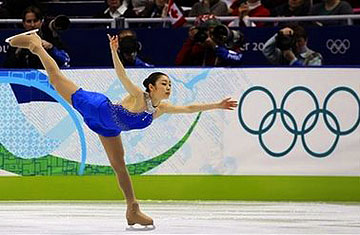
South Korea's Kim Yu-Na performs her free program during the women's figure-skating competition at the Vancouver Olympics on Feb. 25, 2010
(2 of 2)
While Asian skaters collected an impressive number of medals in Vancouver, many of these nations — Korea, Japan, China — have only rudimentary figure-skating programs, and most are still in the process of building an infrastructure for the sport, with élite-level coaches and comprehensive training from the novice level up. The country with the most advanced program is China, thanks primarily to the efforts of one man, Yao Bin, who in 1980 was part of China's first pairs team to compete in a world championship. After a 15th-place showing there that he considered disastrous, Bin built a pairs-skating program in Harbin from the ground up, recruiting skaters and pairing them based on who he thought were best matched in skill, size and technique. At the 2002 Olympic Games in Salt Lake City, he coached Xue Shen and Hongbo Zhao to the country's first Olympic medal in pairs, a bronze; he also helped them to a world championship. In Vancouver, he put two couples on the podium, including gold medalists Shen and Zhao, who had waited eight years for their win. Bin was and still is the only man that any Chinese pair with Olympic dreams seeks out.
Coaching choices are just as slim in Korea and Japan. In Korea, where short-track speedskating has traditionally earned more medals and respect from fans, figure skaters often have to share precious ice space with speedskaters, limiting their ability to build speed and work on expansive elements such as spirals and intricate footwork sequences. Things aren't much better in Japan, where crowded sessions forced Asada, as an up-and-coming talent in the early 2000s, to train for a few years in California before returning to a new rink built in Nagoya.
Kim had to look overseas as well, when her talent outmatched the coaching skills in Korea. She sought out a training facility in North America or Europe, landing in Toronto, where Canadian Olympic silver medalist Brian Orser was just beginning his coaching career. Having decided to adopt a hands-on approach, Orser skates along with Kim during most of her training sessions, pushing her to the remarkable speed she achieves as she flies across the rink. The move may have been just what Kim needed. "I think Yu-Na improved so much in Canada," says Jae Eun Chung, director of the Korean Skating Union. "The Korean culture values being quiet, but in figure skating, you need to express various feelings. She improved her confidence and her expression."
Orser agrees. "She was a 15-year-old girl when she first came. She was a bit gangly, and she didn't have the confidence that she has now. But there was raw talent, speed and awesome jumps. She was a blank canvas."
For now, says Chung, such talent can't be cultivated on home ice. Coaches in Korea don't have the expertise to refine techniques in spins, jumps or footwork to the level of Olympic perfection, so they are sending their most promising skaters outside the country. But with the growth in interest that Kim has nurtured — she is one of the most recognized and highly paid celebrities in the country today — Korean skating officials realize they need to build more rinks and recruit more coaches, and fast. "After Kim Yu-Na became so popular, the number of students in our figure-skating club [more than] doubled, from 30% to 80%," says Hyun Ok Chung, deputy manager of Mokdong Ice Rink, one of the most prestigious skating clubs in Seoul. "Hundreds of students who apply for figure skating are on the waiting list because we already reached the maximum number. We plan to renovate the ice rink to accommodate more students." The rink is also planning to institute one-day workshops to address the sheer volume of interest in figure skating.
If skating officials don't ride the momentum Kim has generated, young skaters may continue to train elsewhere, a huge burden for those who may have talent but can't afford a transoceanic move and may therefore give up skating dreams altogether. "I've thought about it but haven't made any plans," said Kwak, Kim's 16-year-old teammate, who finished 13th. "Compared to other countries, we have fewer skaters and fewer coaches."
Kim's victory is just the catalyst that could change that and nurture the growth of an entirely new sport in Korea, even if she is too humble to admit it. "Watching Korean athletes in short track and speedskating win medals on television, I was happy I could contribute to that," she said. "I hope that by seeing me, it gives other Korean athletes hope and lets them dream like I did."
— With reporting by Geoffrey Cain and Seok Joon Hong / Seoul
